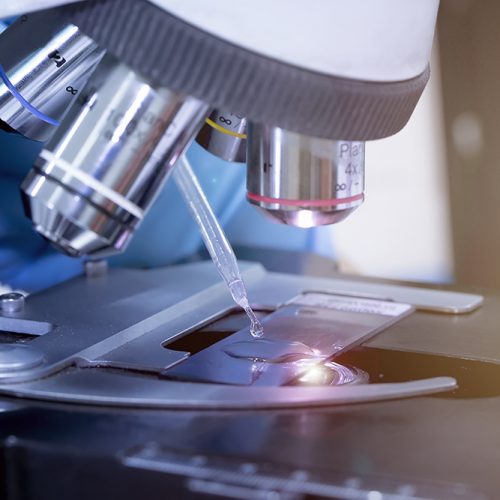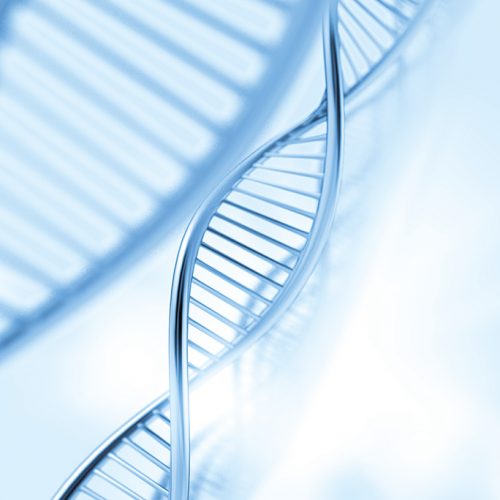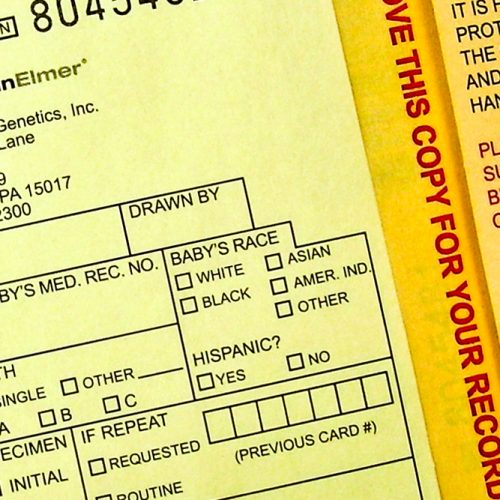>>> The Screening
The possibility of early diagnosis of rare genetic diseases before they cause serious damage to the child
There are rare genetic diseases, mainly metabolic, not easily diagnosable, that occur in the first days of life with generic symptoms which are often confused with that of more common diseases. The aim of newborn metabolic screening is an early detection of these diseases in order to establish an effective therapy before they can cause serious damage to the child, especially at the neurological level. Programs for neonatal screening of metabolic diseases have begun to be mandatory in many nations of the world.
In Italy Neonatal screening is compulsory only for 4 hereditary diseases. Bioscience Institute provides the service of Expanded Newborn Screening StepOne, evaluating more than 50 diseases.
>>> Methods StepOne Tandem - mass
The tandem -mass spectrometry is a diagnostic method that allows to measure, from a drop of blood, the substances present within the cells during chemical reactions due to oxidation of nutrients. In a patient suffering from enzyme deficiencies may occur alterations from the point of view of the chemical reactions, the consequence of which can be the excess of toxic substance or the absence of a substance necessary for the organism.
The PerkinElmer Genetics through the tandem-mass spectrometry identifies and measures almost 60 substances, called metabolites, and then assesses the possible presence of inherited metabolic diseases.
>>> In case of a positive screening
PerkinElmer Genetics, in case if the screening results are positive, makes further investigation through analysis of biomolecular sample. Frequently to a metabolic disorder corresponds genetic character alteration, almost always caused by genetic mutations. PerkinElmer Genetics, thanks to the use of most sophisticated diagnostic technology, is able to perform the above analysis in a very short time.
HMD
(Hereditary Metabolic Diseases)
>>> What are
Hereditary metabolic diseases (HMD) are rare genetic diseases: an error in the DNA negatively affects enzyme activity, sometimes canceling through and through. When an enzyme is not working, it affects the series of chemical reactions essential for the functioning of the cell, and consequently the organs of the organism. The group of enzymes that works in the chemical reactions necessary for the oxidation of nutrients (sugars, proteins, fats) in this sense plays a very great importance. The same reactions are essential to cope with the fast and transform the reserve substances into energy. The enzyme defects that characterize the HMD are dangerous because they cause toxic effects on the body when you take common foods (including breast milk), or following a prolonged fasting.
The nervous system is the first to take damage, often irreversible. If the disease is diagnosed early, however, you can avoid the poisoning that causes permanent damage to the nervous system through a food therapy and targeted drug. The diagnosis of these diseases is often delayed because the symptoms, rather general, appears in the first days of life and is attributed to more common diseases. The diagnosis of the HMD can be made only through biochemical analysis, which does not fall within the routine diagnostics. Some minor and intermediate forms occur in the infant or child, the first symptoms occur at weaning, or during febrile infections or in cases of poor nutrition. In other cases the symptoms are characterized by a developmental delay or loss of acquired skills.
>>> Specimen Collection
A small heel prick and collection of a few drops of blood for the diagnosis of many genetic diseases.
The sample collection for the Neonatal Screening StepOne can be made on the occasion of the sample taking that is made by law in Italy.
In case of discharge prior to 48 hours after birth, the sample can be carried out by the pediatrician.
It is essential that the procedure of collection of the blood sample is carried out properly, as described below. The staff of any health care facility has the skills to perform blood collection for the Neonatal Screening StepOne; suggest, however, to print out and give to responsible person the technique involves a heel prick and collection of a drop of blood for each of the circles of the cardboard StepOne ® (as shown in figure 8 and figure 7 on p.2 of module instructions to withdraw). After sampling the StepOne card must be filled out, inserted in the envelope provided by the Bioscience Institute and sent to the USA at the laboratory PerkinElmer Genetics, where the Screening will be provided.
>>> Advices for sampling
The StepOne ® Screening can be done at any age, except for Cystic Fibrosis (only up to 3 months of life of the newborn).
► Do not take the sample earlier than 48 hours after birth
► Do not take the sample after a transfusion
► If the baby needs transfusions, take the sample 3 days after the last transfusion
► Do not touch the circles absorbent of filter
► Allow the filter to dry for at least 4 hours
► Apply each drop of blood to a single circle and only on one side
► Each drop collected must be absorbed completely and occupy fully the circle
List of Hereditary Metabolic Diseases
The list of HMD List of Hereditary Metabolic Diseases NEONATAL SCREENING METABOLIC WIDE - StepOne ® PERKIN ELMER GENETIC LABORATORY (USA)
A. Disorders organic acids · HMG
► Glutaric acidemia type I (GA I)
► Isobutyryl -CoA Dehydrogenase Deficiency
► Isovaleric acidemia (IVA)
► Deficiency of 2- Methylbutryl -CoA Dehydrogenase
► Deficiency of 3 - methylcrotonyl -CoA carboxylase
► Deficiency of 3 - Methylglutaconyl -CoA hydratase
► Acidaemias Metilmaloniche
► Methylmalonyl -CoA mutase deficiency
► Defects on the synthesis of adenosylcobalamin
► Deficiency of Vitamin B12 maternal
► Deficiency Mitochondrial acetoacetyl -CoA thiolase
► Propionic acidemia
► Multiple Deficiency ( CoA ) carboxylase
► Malonic aciduria
B. Disorders in Oxidation of acids
► VLCAD (Very Long Chain Acyl -CoA Dehydrogenase Deficiency )
► Deficiency Carnitinia / acylcarnitine translocase
► Carnation Transferase Deficiency Type I
► MCAD (Medium Chain Acyl -CoA Dehydrogenase Deficiency )
► LCHAD (3- Hydroxy Long Chain Acyl -CoA deydrogenase Deficiency )
► Deficiency of 2,4- Dienol -CoA Reductase
► MAD (Multiple Acyl -CoA Dehydrogenase Deficiency )
► CPT type II ( Neonatalo Carnation Palmitoyl Transferase Deficiency )
► EXP (Short Chain Acyl -CoA Dehydrogenase Deficiency )
► SCHAD (Short Chain Hydroxy Acyl -CoA Dehydrogenase Deficiency )
► TFP deficiency ( Trifunctional Protein Deficiency )
C. Disorders in Amino Acids
► Argininemia
► aciduria Argininosuccinic
► 5 - Ossoprolinuria
► Deficiency of carbamoyl phosphate Sintetase
► Ctrullinemia
► Homocystinuria
► Ipermethioninemia
► Hyperammonemia , Iperornithinemia , Omocitrullinemia ( Syndrome )
► Iperornitinrmis with atrophy
► Disease "Maple Syrup Urine "
► Phenylketonuria :
1. Classical - hyperphenylalaninaemia
2. Cofactor Biopertina
► Tyrosinemia :
1. Transient Neonatal tyrosinemia
2. Tyrosinemia type I
3. Tyrosinemia Tito II
4. Tyrosinemia type III
Disorders analyzed using biochemical and molecular techniques :
► Deficiency Biotinidase:
1. Complete
2. Partial
► Congenital Adrenal Hyperplasia :
1 . 21-hydroxylase deficiency " Salt Wasting "
2 . 21-hydroxylase deficiency "Simple virilizing "
► Congenital Hypothyroidism
► Cystic Fibrosis
► galactosemia :
1 . Deficiency Galattocinasi
2 . Deficiency galactosidase -1-phosphate Uridiltransferasi
3 . Galactosidase deficiency -4- Empimerasi
► Deficiency of Glucose-6 -Phosphate Dehydrogenase
► Emoglobinopatie
► Hemoglobin S, S / C , S / Beta - Thalassemia Disease C , & E
Other analyzes :
► hyperalimentation
► Liver disorders
► Management of medium-chain triglycerides
► Presence of EDTA anticoagulants in the blood sample
► Treatment with Benzoate , Acid Rivalico , valproic acid
► Deficiency consumption Carnation
SCID (severe combined immunodeficiencies)

The immune system of these children is so compromised that the body is unable to defend itself, even from common infections such as colds or chickenpox.
At the first manifestations of an infectious nature, other phenomena are generally associated, such as slowing down in growth, skeletal anomalies, deafness, neurological and behavioral alterations, autoimmune phenomena.
In the absence of effective treatment, the disease can be fatal within the first years of life.
Until recently, the only curative treatment was the transplantation of bone marrow or cord blood from a compatible donor. The new therapeutic frontier is gene therapy, already effective for some pathologies, such as the de cit of adenosine deaminase (ADA - SICD).
Lisosomal Diseases

The alterations involve a build-up within the lysosomes of materials that are not degraded; this, in turn, involves cellular damage and tissue.
These are diseases whose most typical clinical manifestations are: enlargement of the liver and spleen, involvement of the central nervous system, with progressive loss of neurological functions, alterations of the eyes, heart and musculature. The age of onset is variable, but generally pediatric.
If the parents are healthy carriers of the responsible mutation, each child has a 25% chance of inheriting the disease. In two cases (Fabry's disease and mucopolysaccharidosis type 2) the transmission is X-linked recessive: in general only males have symptoms, while females are healthy carriers. Depending on the disease, the possible treatments are:
enzyme replacement therapy, bone marrow transplantation, administration of drugs that reduce the synthesis of substances that are not ef ciently degraded in lysosomes, stimulation of residual enzyme activity through drugs that stabilize the mutated enzyme.
Screening request

Bioscience Institute offers two different survey panels:
Step One ® Neonatal Screening
The first panel that Bioscience Institute proposes includes Hereditary Metabolic Diseases due to the lack of production of important enzymes or to the inability to use substances that are fundamental for life. Currently, diseases subject to mandatory neonatal screening at Italian hospitals are only three: phenylketonuria, congenital hypothyroidism and cystic fibrosis. With the extended metabolic screening of the Bioscience Institute, up to 55 pathologies can be recognized promptly. Cost € 350.00
Step One ® PLUS Neonatal Screening
In addition to the Screening Step One ® Bioscience Institute proposes a further study to recognize two other categories of diseases, severe congenital immunodeficiencies (SCID) and lysosomal storage diseases (LSD). Cost € 600.00
To perform both tests it is sufficient to take a few drops of blood from the heel of the newborn. The sampling is usually carried out after at least 48 hours of life, following breastfeeding, so that the metabolism is activated. Bioscience Institute entrusts the analysis to PerkinElmer Genetics, world leader in the field of genetics.
For parents who also perform cord blood collection, the Step One ® Screening service is offered at a cost of € 200.00 and the Step One ® PLUS Screening service at € 400.00.

